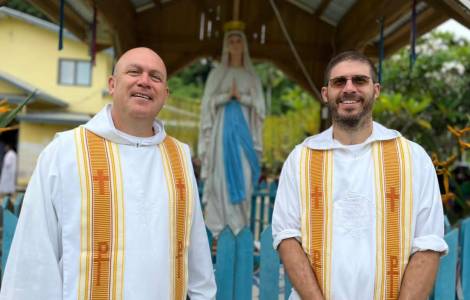
by Fabio Beretta
Vanimo (Agenzia Fides) - The blue ocean on one side, jungle and forests on the other. This is how the northern part of Papua New Guinea, the second stop on Pope Francis' long journey through Asia and Oceania, looks at first glance. Villages scattered between the beach and the highlands, without electricity, without water pipes, without supermarkets.
In Papua New Guinea, the second stop on his 45th Apostolic Journey, Pope Francis will also meet the missionaries of Vanimo, who have come from far away to continue the work of those who preceded them in proclaiming the Gospel in this peripheral area of the continent that takes its name from the ocean.
Dialogue and respect are key words here, explains Father Alejandro Diaz (51), an Argentine missionary of the Institute of the Incarnate Word (IVE), to Fides: "I came here a year ago to live in the first male monastery in Papua New Guinea. The monastery in the village of Wutung (in the north, a few kilometers from the border with Papua, ed.) is already active."
"We live the contemplative life typical of monks, we dedicate ourselves to prayer and live from what we produce. But we are also missionaries and the garden is not only in the monastery. We have come into contact with various villages in the jungle and teach them how to cultivate the land, raise cows, geese or chickens," he says.
With regard to the Pope's visit, there is a lot to do, a lot to prepare: "Fortunately, many have accepted the Gospel and when they heard that the Pope was coming, everyone agreed to help us," says Father Diaz.
There is a bond of friendship between the Bishop of Rome and the community of missionaries working in northern Papua New Guinea. A bond that began years ago: "He has always supported us. Thanks to the help he sent us, we were able to build a boarding school for boys and find off-road vehicles to move through the jungle." With the Pope's support, "we were also able to buy a small bus that serves as a school bus for the villages."
"The Pope," says the missionary, "has been very insistent on coming here to Vanimo, a small town (150,000 inhabitants, ed.) that is very poor. Here he will meet the local community and he will come to a nearby village, Baro, for a private visit to our school." There he will be welcomed with a concert prepared by the students, who have been practicing their instruments for weeks. "Pope Francis will bless 25 images of the patron saint of Argentina, Our Lady of Luján (an icon that the Pope will also honor by presenting the golden rose, editor's note), since the Pope's arrival coincides with the 25th anniversary of the arrival of the statue of Our Lady of Luján in Papua New Guinea. "The images he will bless will later be donated to the chapels of the villages in the jungle."
For days, many people have been flocking to Baro and Vanimo, not only to hear and see the Successor of Peter, but above all to help set up the premises for the ceremony: "The other day we went deer hunting with a confrere. People also ask us for accommodation and come without anything because they have nothing. Many have come on foot, some without shoes. They have walked for days and are happy to help us prepare what is needed."
Father Diaz reports that relations between the missionaries and the population are “very good.” “They welcomed us well,” he affirms. “They are open to the encounter with Christ and to the Catholic faith as it is offered to them.” Everyone has participated in meetings, celebrations and Eucharistic adoration in recent days to prepare for the Pope’s arrival. “Even non-Catholics have done this. We live here in mutual respect,” says the missionary.
“Unlike in other parts of the world,” admits Father Diaz, “here everyone has a religious sense. A few days ago we had a night procession with the Bible. Many people participated, including non-Christians. And we prayed with a universal prayer that puts God at the center.” And this unity is also evident in the preparations for the Pope's visit: "Even the leaders of other religions have asked us for permission to participate because they understand that it is an important event."
"Faith is strong here. I was in the jungle," Father Diaz continues, "and it is beautiful to see that in the small streets you find people who, with a simple heart, ask you to stop and say Mass and give Communion. They tell us: 'We need confession.' They have great respect for the priest and the Eucharist, especially the children. The churches here are full of young people and children. And that is exactly what the Pope will find: a young Church thirsting for the word of God."
"Their joy," the missionary underlines, "lies in faith. It is their wealth and their precious possession, and that alone is enough for them. We can only accompany them and help them on their journey of faith."
The missionaries have chosen an approach that trusts in the times, without coming into conflict with local customs and traditions. "We are not eradicating local cultures. There is a lot of magic, superstition, witchcraft... but customs and traditions are important. We are gradually clarifying all the elements and people are increasingly understanding and accepting the Catholic faith."
Of course, there are also difficulties: "Some tribal leaders do not accept these teachings. They think," says Father Diaz, "that we want to rob them or that they do not want to give up the worship of spirits or natural elements. Our task is to explain to them well that we want to help them and share with them things that are good for their lives." And the Pope's visit "is like a caress for us missionaries. We feel encouraged to continue on this path." (Agenzia Fides, 6/9/2024)